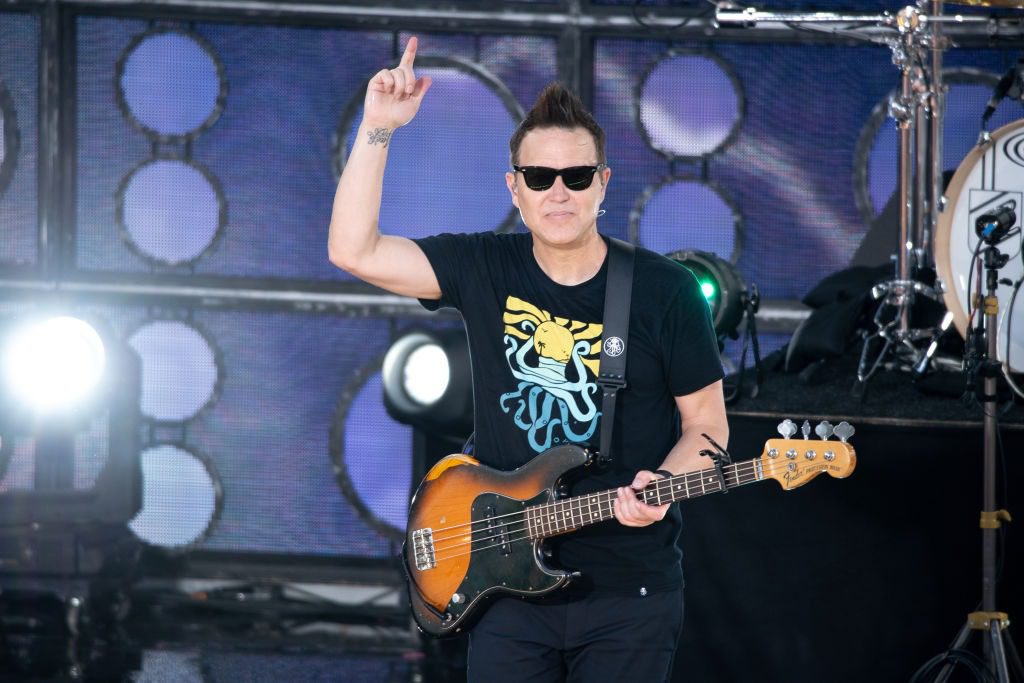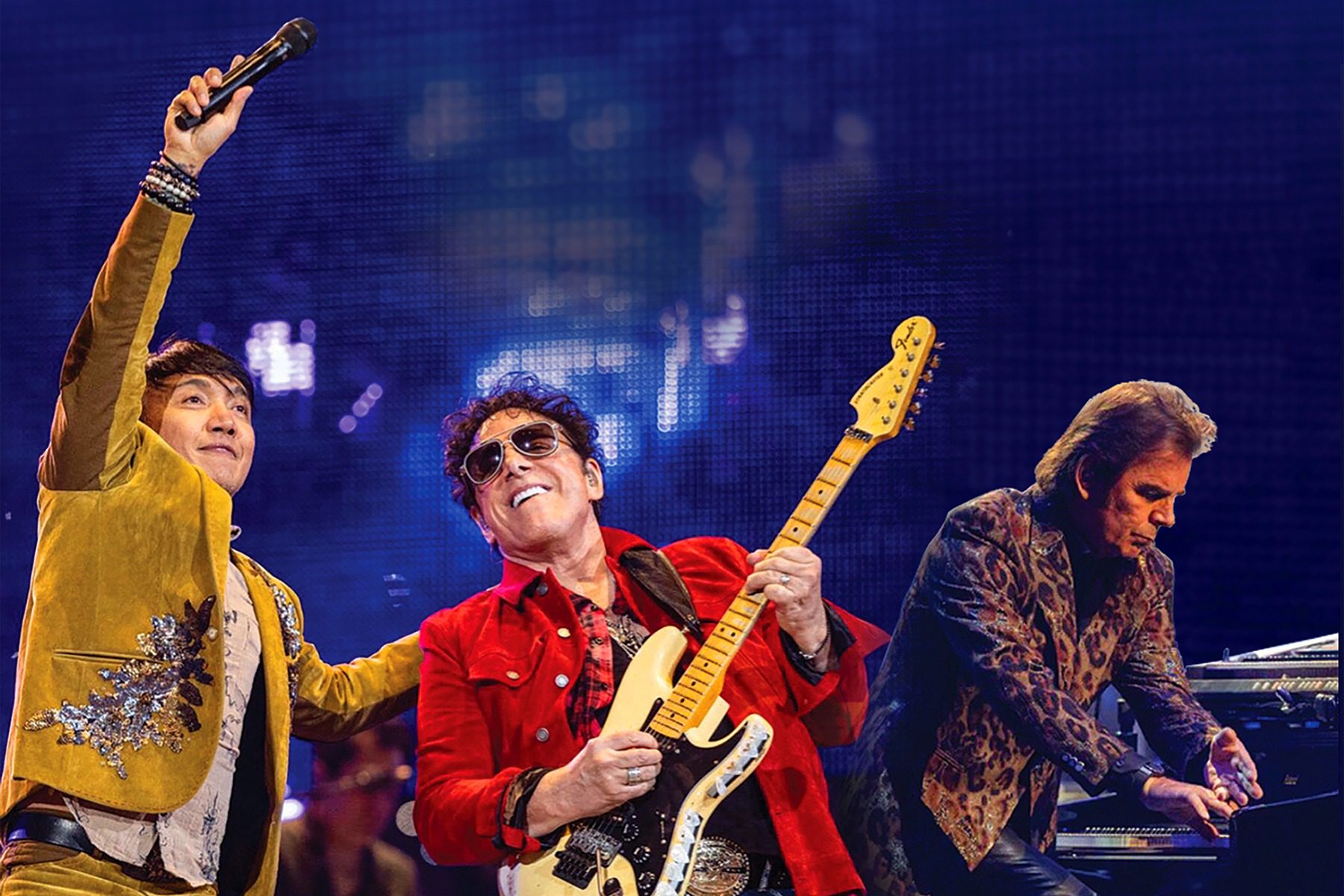Liz Phair Talks Life in Exile and Making ‘Offensive’ Punk Playlists
Over the past few years, Liz Phair’s exile has been self-chosen. Her father was an infectious disease specialist, and her son has severe asthma, so she has taken Covid-related precautions seriously and hunkered down at home. “The threat part of Covid hit me at a level that was just not rational,” she says on a call from her L.A. home. “I had seen my child not be able to breathe so many times when he was young that I was just like, ‘Nope.’ But we had a lot of fun in the house; we figured out ways to make it work. The silver lining of Covid was the reprioritization of what’s important, the appreciation of what you do have and the hunger to live life to make the most of every single day.”
One of the ways she was able to escape during lockdown was by listening to audiobooks. “I listened to a lot of self-help books,” she says, laughing. “But I also went back to, like, Edith Wharton, Age of Innocence. I used Audible like a time machine. I wanted to get far away from the present moment in the last year.”
blogherads.adq.push(function () {
blogherads
.defineSlot( ‘medrec’, ‘gpt-dsk-tab-article-inbody1-uid0’ )
.setTargeting( ‘pos’, [“mid-article”,”mid”,”in-article1″,”mid-article1″] )
.setSubAdUnitPath(“music//article//inbody1”)
.addSize([[300,250],[620,350],[2,2],[3,3],[2,4],[4,2],[640,250]])
;
});
Now she has made a podcast of her own with a new episode of producer Gunpowder & Sky’s Words + Music series for Audible, titled Never Said Nothing. Over the course of 90 minutes, the singer-songwriter reconsiders her entire career, from her early interest in visual art through her recent Soberish album, in addition to playing new and unusual, stripped-back arrangements of tunes from throughout her career. As she analyzed her songs, she found new perspectives on her own career.
In one excerpt, premiering here, she performs her Exile in Guyville song “6’1″‘ and reflects on the cultural scene she was operating in in the Nineties. In another, she reflects on how Guyville impacted her family and herself in ways she didn’t expect.
“I love to have deep conversations about the artistic process and music,” she says, explaining why she wanted to record Never Said Nothing during a wide-ranging conversation with IndieLand. “I like to analyze or just discover emotionally the connection between what comes out in a song and what part of you created that song. I think of my albums as almost like the way people keep photo albums of what they’ve done, where they’ve been. So it seemed like, ‘Let’s take a music album deeper.’”
At one point in the episode, you call Exile in Guyville “my defining record.” You’ve done countless interviews about that album since it came out. Does it bug you that people obsess so much on your first record?
There was a point in my career where that irked me, and I think that was when I was closest to it; when I was trying to create new material and everyone just wanted me to do another Guyville. That would have been anywhere from one to 10 years. But the way I look at it now is, it was a culmination of a great deal of experimental songwriting that you could hear in the “Girly-Sound Tapes” and a formalization of those musical impulses into something that I took as seriously as I would have taken a large senior project in college. So I was reaching above who I naturally was. And I feel like people were introduced to me with that vision, and it consolidated an idea of me in their minds. And it defined me. It felt like the culture had needed someone to say those kinds of things, and there I was, right place, right time, and those things are just impossible, they don’t happen that often.
Toward the end of the episode, you say, “Once you pass 50 you’re supposed to think what your dreams are and what you should be doing about it.” What are your dreams and what should you be doing about it?
I’m at the point in my career where I’ve been as good as I’m ever going to be. So now it’s kind of like, you just want to see yourself aim and hit the target. When I was younger, I was almost in a defensive stance. I felt really vulnerable, and I didn’t understand what was happening around me, and I didn’t know what my actions would create in their wake. So a lot of it was about, “I did this and impulsively did that,” and then I had to kind of grapple with the mess that was created. So it was a lot of Sturm and Drang in my youth, which was ferocious and very appealing. I think that’s what people want from me still when they’re grumbling about it not being like Guyville, but I can’t produce it from my 50-year-old body [laughs]. I feel the same sense of satisfaction when I do something well that I wanted to do well, as I did when I was younger tearing shit up.
You’ve joked about having a “polarizing career,” with fans turning on you when you wanted to make pop music. Does it bother you to be polarizing?
It does. And unfortunately, it’s a feature, not a bug. I’ve concluded that my personality is just not fitting in with … I don’t know what it is, but I am always, without necessarily intending to be, polarizing. And I don’t have an answer for why that is, but it has completely followed me, dogged me in every part of my career. It’s just something about the way I am or the way my brain works or who I am is polarizing. That’s true, even in my personal life; I’m not polarizing when people are mad at me, but my friends being closer to each other in similarity than I am to them, even though we’re very close. I’m just a weirdo, I guess. I was made odd.
blogherads.adq.push(function () {
blogherads
.defineSlot( ‘medrec’, ‘gpt-dsk-tab-article-inbody2-uid1’ )
.setTargeting( ‘pos’, [“mid-article2″,”mid”,”in-article2″,”mid-article”] )
.setSubAdUnitPath(“music//article//inbody2”)
.addSize([[300,250],[300,251],[620,350],[2,4],[4,2],[3,3]])
.setLazyLoadMultiplier(2)
;
});
You speak a lot about your ambivalence toward performing in the episode. What do you get out of playing live today?
The Guyville reissue through Matador brought back so many happy memories that fans were ready to forget the whole “She went pop” thing. It was all water under the bridge at this point. That made it a real pleasure. Everyone was like, “Let’s just enjoy this.” And that was something that I will treasure for the rest of my life. And I owe a lot of that to my management because they helped me orchestrate this sort of resurgence of me after 10 years, and it wasn’t easy, like going out to play by myself in opera houses, opening for Smashing Pumpkins is like, “Do you have stage fright? Would you like to go right into the eye of the storm?” But the memories that I’ve gotten over the last five years have just been fantastic, and I will treasure forever. Covid really brought an end to my little run, but it was a good one.
Are you not going to tour again?
Oh, no, I will. We just got to see what is going to happen. Like, the music right now is struggling. The venues are struggling, the musicians are finding their way. I don’t know if you know this, but it’s hard to get insurance for Covid out there so there’s a lot of uncertainty around that. I want to get through the holidays, make sure we’re all healthy and try out our immune systems in the real big bad world and see what happens.
You have said that you want to make two final albums, with Soberish being one of them. Do you have a plan for this final album?
I do, but I haven’t landed on it. Like just a month ago, I was sure I was going to do an album of punk covers. Usually before I start a record, I have a full vision of what I’m trying to do. So I’m just kind of waiting ’til that shows up. I don’t mean that to sound mystical. I’m not, like, a mystical person in that sense, but it does come from the unconscious a little bit.
blogherads.adq.push(function () {
blogherads
.defineSlot( ‘medrec’, ‘gpt-dsk-tab-inbodyX-uid2’ )
.setTargeting( ‘pos’, [“mid”,”mid-articleX”,”in-articleX”,”mid-article”] )
.setSubAdUnitPath(“music//article//inbodyX”)
.addSize([[300,250],[300,251],[3,3],[620,350]])
.setLazyLoadMultiplier(2)
;
});
What punk songs inspire you?
Oh, God [laughs]. All right. I’m going to confess this because then I went back to the playlist that I made, and it’s entirely offensive. So now I have to start from scratch. It’s like so offensive. These are songs that I loved in my youth, and I was so happy with that playlist until I really listened. I’ve heard these songs so many times I forgot what the words were actually saying, and I’m not even sure if people are aware enough about what the spirit of punk was in terms of being provocative. I think people take it too literally now. But, you know, it had that one song that like, “I killed your baby today.”
The Misfits’ “Last Caress”?
Yes, yes! I started off with that. There was that and Minor Threat, and it was a really, really good playlist. And I’m sorry to tell you, it was just offensive. So many things that punk embodied that were deliberately offensive, and we knew that we understood that to be offensive in punk was part of what the aim was because people looked at punk as dirty and unlawful, whatever. So they were kind of playing that up, throwing it back in the face of the people looking. And I understood that perfectly then. But I just don’t think in today’s climate, when we’re really pausing to try to correct some things in our society that have been toxic and undermining, it just isn’t the time.
I was very much product of that time. Like, I was a provocative artist from the get-go. I mean, I was at, like, Big Black shows. It was me, downtown and standing in the corner in my big black boots, smoking, thinking so scared, but trying to look completely normal. It was interesting back then to feel like a pirate in society. There wasn’t internet. You had to seek these punk scenes out; you had to know who to ask and what fliers to pick up, what fanzines to read. The subculture had a cachet because you had to earn it in a way that we don’t have now; everything’s at our fingertips.
I interviewed Glenn Danzig, who wrote “Last Caress,” earlier this year and he said it was just a song to piss people off. He also said he didn’t think punk could happen today because of cancel culture.
You couldn’t. What’s sad about it is, is that like both scenes, if you want to call it that, are trying to do the same thing. They’re trying to make you look at society and what we don’t see, what we just take for granted, that’s pretty fucked up. They’re both intending to disrupt the power structure. You know, there’s a lot of punk bands that were straight edge. Think about the perception of punk and then think about that.
I have these super overtly sexual songs in my catalog, and I think everyone understood what they were, what I was trying to do, but since 2015, I don’t want to play them live because Trump was such a toxic male presence, and everything related to him and everyone who supported him. I couldn’t say these things about wanting to be a “blowjob queen” or “hot white cum” because it was improperly contextualized in that atmosphere. It would be like giving them something. I don’t know what it is. I can’t even articulate it, but my band would be like, “Let’s do this.” I’m like, “No, I’m not doing that right now. I’m not taking my song out of its proper context and giving it to this moment in history because it’s just. … No, there’s too much of that toxicity to have it ever be understood.” You know, when you’ve got a president who’s a pussy grabber, it just doesn’t feel the same.
blogherads.adq.push(function () {
blogherads
.defineSlot( ‘medrec’, ‘gpt-dsk-tab-inbodyX-uid3’ )
.setTargeting( ‘pos’, [“mid”,”mid-articleX”,”in-articleX”,”mid-article”] )
.setSubAdUnitPath(“music//article//inbodyX”)
.addSize([[300,250],[300,251],[3,3],[620,350]])
.setLazyLoadMultiplier(2)
;
});
I wrote about Nirvana’s Nevermind reissue and thinking specifically about how “Polly” wouldn’t be received the same way today. I feel like Generation X dealt with its angst through irony where younger generations are more sincere.
I think that’s very much the case, and in fact, that could explain almost all of it. And that’s why it doesn’t translate because the irony isn’t translating. Poor millennials; they’re losing out on dry wit [laughs].
One thing I like about your Words + Music is the way you stripped down some of your songs. I felt like I could hear some almost Celtic melodies in “Shitloads of Money” and some Joni Mitchell–like chord changes in “The Game.” They gave me a new perspective on the songs.
I’m so happy you noticed. I took those two songs and I transcribed them into an entirely different tuning. That’s one of my favorite things to do, and it’s not very popular with the band or management. Both songs that you mentioned were played in entirely different ways, because I picked up a really weirdly tuned guitar and sort of picked out the weird melodies where it’s an entirely different interpretation. I love doing that. I’d be like Taylor [Swift]; I’d rerecord all my records in these weird ways [laughs].
Lastly, you joked at one point in the episode that you can’t join the TikTok generation. Why not? Fleetwood Mac made it work.
I think I need a TikTok buddy to get me on there. It’s too fast and if you’re good at it, you have to keep doing it. With Twitter, you can go in and out, and Instagram, I guess, is more of a commitment, but I never was interested in Instagram. But like TikTok, I just feel like to have one good time means you have to just keep doing it. It’s like it’s so fast-paced and so immersive that you can’t just jump in and jump out. I’ll leave that to the kids.


